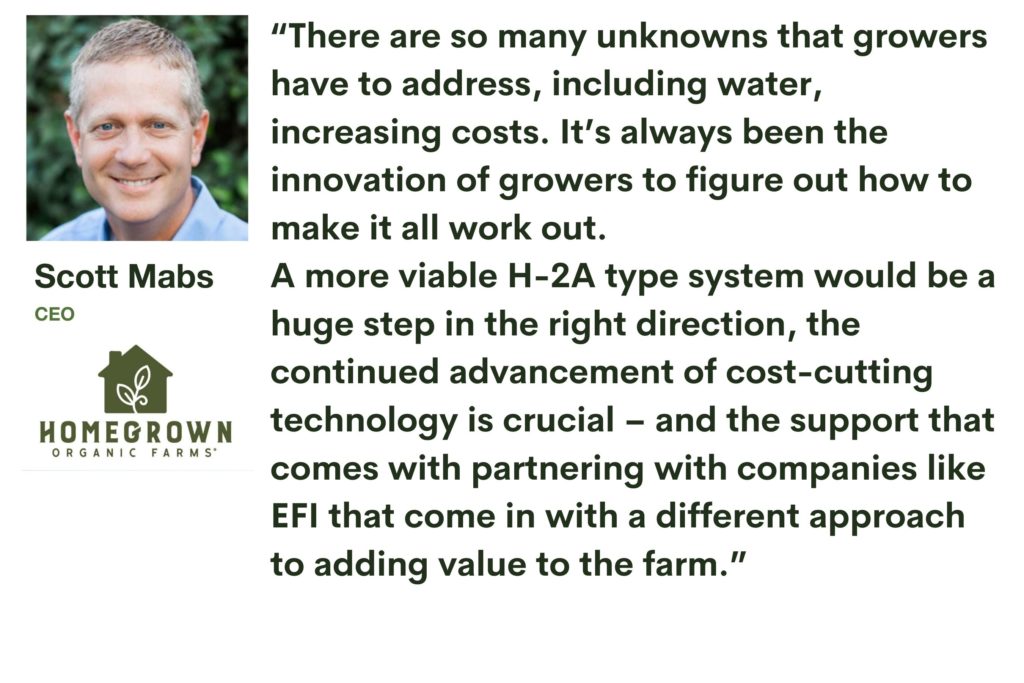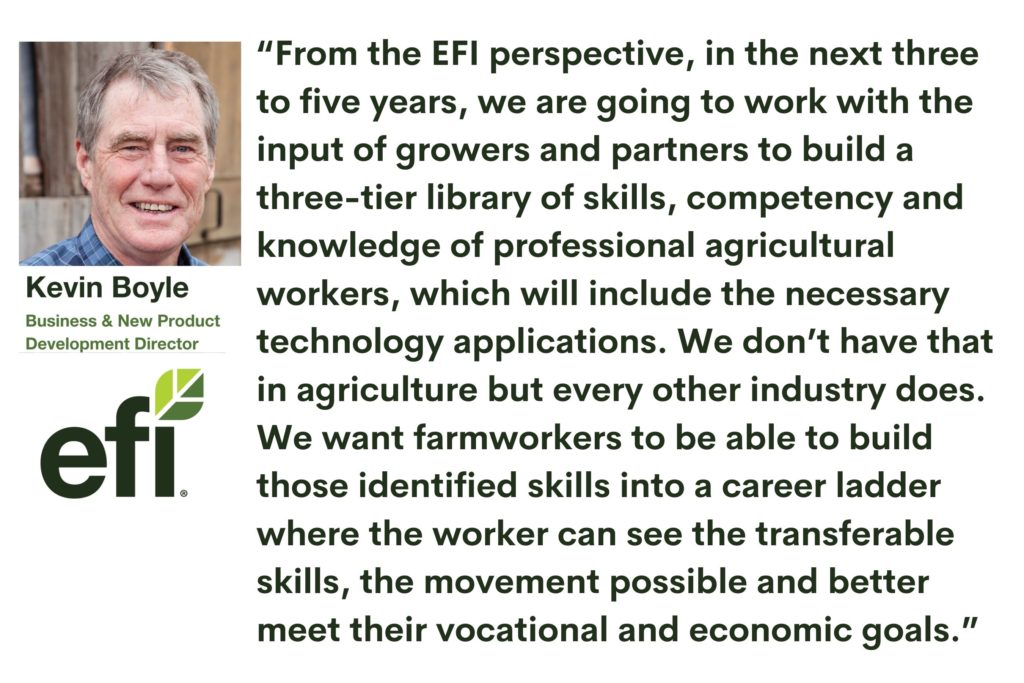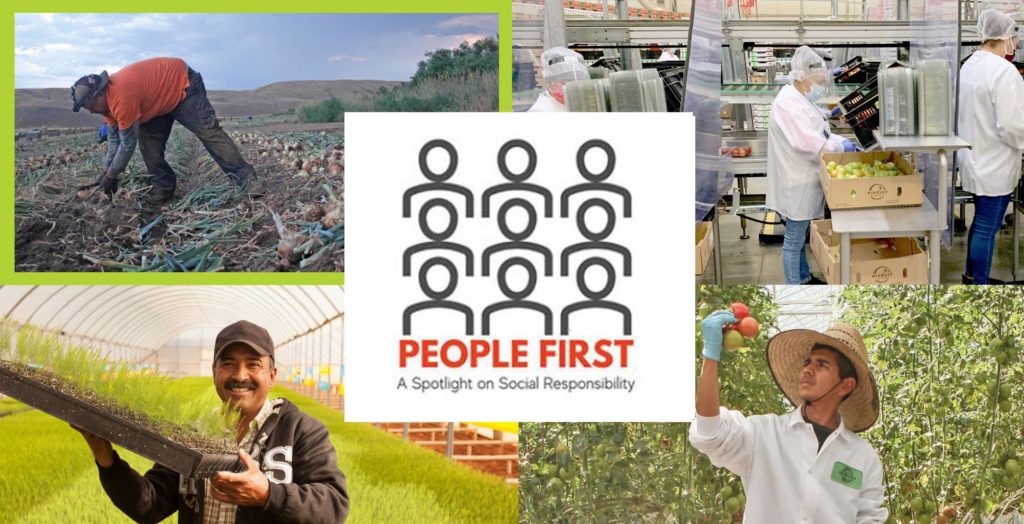Rethinking the Way Work Is Done Adds Value to the Supply Chain


In the first webinar of the People First series presented by The Packer and Equitable Food Initiative (EFI), Scott Mabs, CEO of Homegrown Organic Farms, and Kevin Boyle, Director of Business & New Product Development for EFI, discuss drivers of change and innovation surrounding today’s challenges and opportunities in agriculture for American farmers, including real world examples that demonstrate how broadening employee perspectives and increasing employee engagement add value to the supply chain.
Challenges Are Never in Short Supply
For many American growers, “tomorrow’s challenges” have become today’s reality: decreases in available labor, shifts in required skills for farming jobs, fluctuations of supply chains that affect economic margins, rapid innovations in technology, rises and falls of regional markets and changes in weather and seasonality conditions.
“Questions that maybe in the past we philosophized about, talked about, today are coming to reality. Out of challenge and necessity comes the innovation and that’s where we are right now.”
– Scott Mabs, CEO for Homegrown Organic Farms
Move From Challenge to Opportunity by Adding Value Beginning to End
Moving from challenge to opportunity hinges on innovation. Rethinking and redesigning the way work is done creates fresh ground for new innovations and solutions that would otherwise be out of reach.
“We’ve got to find ways to add value across the supply chain from the moment that plant goes in the ground to the moment it gets to the retailer in its packaging, through shared information, material, people and knowledge—all the way through so that everybody who is touching that product has the end in mind.”
– Kevin Boyle, Director of Business & New Product Development for EFI
Actions like tying a product to its origin story or processing and packaging it are ways growers have added value to fresh produce for consumers, but rethinking the way work is done on the farm unearths solutions for another level of added value across the entire supply chain.
Tearing Down Silos
Tearing down the divides that exist in the supply chain between the phases of work – on the farm, in the packing house and what’s required to move product to the retailer and consumer – facilitates wholistic advancement throughout the industry.
Beyond connecting specialized areas of work, Mabs and Boyle believe that breaking down the long-standing barriers between labor and management on the farm is necessary for the future success of the industry by making way for increased labor-management collaboration.
Labor-management collaboration on EFI farms has been shown to yield positive business outcomes, including advances in organizational culture and management systems.
Recognizing of the Professionalization of Farm Work
Leveraging the professional knowledge, experience and competency inside the farm gate brings value to the supply chain by improving quality and safety. Boyle notes that farmworkers are the last hands to touch the product before it heads to retailers and consumers, and when looking for ways to make improvements, farmworkers have awareness of the roadblocks affecting quality, productivity and on-time delivery.
“The people with the jobs in the field or packing shed know what they’re doing. Properly pruning a tree takes training and years of experience. It’s not a simple task anyone can do. Farmworkers are professionals at what they do.”
– Scott Mabs, CEO for Homegrown Organic Farms
Engaging on a Deeper Level
Engaging all employees on a deeper level gives access to a wider pool of expertise and ideas. Broadening perspectives of employees within the organization creates a profound impact in the form of fresh eyes on problems that affect productivity, quality and efficiency.
In the webinar, Boyle and Mabs shared two examples of how EFI and Homegrown Organic Farms have approached promoting deeper engagement of the workforce.
EMPLOYEE-SOURCED SOLUTIONS
The EFI Leadership Team of a berry farm followed one of its semitrucks full of the company’s fruit to the distribution center and was able to see all aspects of the process for preparing the berries for retail sale. Team members watched as the berries were offloaded and tested, and they were able to ask questions and learn about the quality indicators.
They learned that an entire truck, worth approximately $250,000, can be sent back and passed on to a cheaper market if one pallet doesn’t meet the quality standards.
As the team returned to the farm, members started to problem-solve and asked what they were doing every day in the field that could impact product quality. They identified the possible detriment of having everyone take the same break time, which could leave harvested berries sitting out in the sun. The team decided to institute a staggered break schedule so that the trucks could get berries to the cooler as soon as possible, which required building support from the vendors and food trucks that supplied farmworker meals, as these suppliers also had to change their schedules.
Within four months, the berry grower had no trucks sent back from the distribution center, preserving the best price for roughly half a million dollars’ worth of product. Prior to that, one to three trucks would be sent back every quarter.
“The employee-led solution of changing the break schedule was a small change that yielded a very large impact. We are seeing these kinds of activities happen across EFI-certified farms in Peru, Guatemala, the United States, Mexico and Canada, concretely showing how rethinking how work is done begins to add value and reduce costs.”
– Kevin Boyle, Director of Business & New Product Development for EFI
EVERYONE THINKS LIKE AN OWNER
In 2021, Homegrown Organic Farms transitioned from a corporation to an Employee Stock Ownership Plan. This move reinforced the power of the impact when every employee understands the importance and critical nature of each job and how it affects the rest of the operation.
Mabs says the move to becoming an employee-owned company was the answer to several questions:
- How do we best help everyone understand the big picture?
- How do we help all our staff feel like owners?
- How can everyone feel like they are a part of making the company successful rather than just doing a job?
WHAT SUPPORT WILL FRESH PRODUCE GROWERS NEED IN THE NEXT THREE TO FIVE YEARS?


Watch webinar 1: Challenges and Opportunities for the American Grower
Other Posts in the People First Series:
Intro to the Ethical Charter on Responsible Labor Practices
How Responsible Recruitment Practices Unlock Competitive Advantage
Myths and Realities of Social Compliance
Summary written by: Amy Beth Dingle, Freelance Writer for EFI


